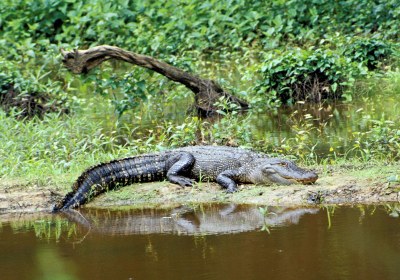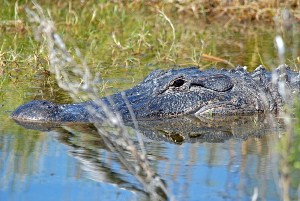Alligator Safety
 When you visit the park, you are a guest in this wild habitat. Treat all wildlife with respect. Feeding, harassing, injuring or removing wildlife, including alligators, is against the law.
When you visit the park, you are a guest in this wild habitat. Treat all wildlife with respect. Feeding, harassing, injuring or removing wildlife, including alligators, is against the law.
Stay safe around alligators by following these rules:
If swimming is allowed, swim only in designated areas. Swimming areas close at sunset. Alligators are more likely to be active at dusk and dawn.
Do not feed or harass alligators. Feeding or offering food, including fish or bait, to alligators in Texas State Parks is not only dangerous, but a violation of state park rules and a Class C misdemeanor punishable by up to a $500 fine.
Inform a park employee right away if you see an alligator in or near the swimming area or if you see people feeding or harassing alligators. Call the telephone number on your park map to report issues.
Other tips:
- Retreat: Keep 30 feet away from alligators at all times. If you get too close, back away slowly. Do not assume that alligators are slow and sluggish. They are extremely quick and agile and will defend themselves when cornered. They rarely chase people, but they can outrun or out swim the fastest person for the first 30 feet.
- Hiss: If an alligator hisses, it's warning you that you are too close. Back away slowly.
- Protect: A female protecting her nest or young may charge if you get too close, but will quickly return to the nest after you leave. Avoid piles of twigs, grasses and/or soil near the side of the lake. Also avoid any group of small alligators under a foot long.
- Bask: Alligators often bask along the banks of ponds or streams. They are usually warming their bodies; they are not actively hunting. Often a basking alligator will have its mouth open. It is cooling itself, as alligators do not pant or sweat.
- Pets: Pets are the size and shape of common alligator prey. Keep them away from the water’s edge and on leashes that are no longer than 6 feet. Do not let your pet drink from or enter the water in alligator habitat. Alligators have a keen sense of smell. Your pet will be curious, and the alligator may see it as an easy food source.
- Advance: Tell a park employee if an alligator comes toward you when you are walking near the water, especially if it comes out of the water. In many cases, people have fed such alligators.
- Fishing: Do not continue to fish near an alligator that is interested in your fishing line or catch. If an alligator takes your bait or fish, cut your line and move to a new location. Don’t use a stringer for your fish; keep them in a bucket.
- Feeding: Nuisance alligators are almost always created by park visitors. If you feed alligators on purpose or by throwing fish scraps, alligators will then associate food with people. Nuisance alligators must be moved or euthanized. If you see a nuisance alligator, consider why it is there.
- Notify: Do not attempt to move an alligator! Notify park employees, who can manage the alligator safely.
Alligator Dos and Don’ts
Adapted from "Living with Alligators," Florida Fish and Wildlife Commission. 
Don't kill, harass, molest or try to move alligators. It is against state law, and a provoked alligator is likely to bite.
Do let park staff know if you encounter a nuisance gator that has lost its fear of people.
Don’t allow small children to play unsupervised in or around water.
Do closely supervise children when they play in or around water.
Don’t swim at night or at dusk or dawn when alligators most actively feed.
Do use ordinary common care. Swim only during daylight hours.
Don’t feed or entice alligators. When fed, alligators overcome their natural shyness and become accustomed or attracted to humans. It is a Class C misdemeanor, punishable by a fine of up to $500, to feed an alligator.
Do tell others that feeding alligators creates problems for those who want to use the water for recreation.
Don’t throw fish scraps into the water or leave them on shore. Although you are not intentionally feeding alligators, the end result is the same.
Do dispose of fish scraps in garbage cans at most boat ramps or fish camps.
Don’t remove an alligator from its natural habitat or accept one as a pet. It is a violation of state law to do so. You cannot tame an alligator, and even small ones may bite. In particular, never go near baby alligators or pick them up. They may seem cute and harmless, but mama alligator is nearby, and will protect her clutch.
Do enjoy viewing and taking photos of alligators from a safe distance of at least 30 feet. Remember that they're an important part of Texas's natural history, as well as an integral part of many wetland ecosystems.
